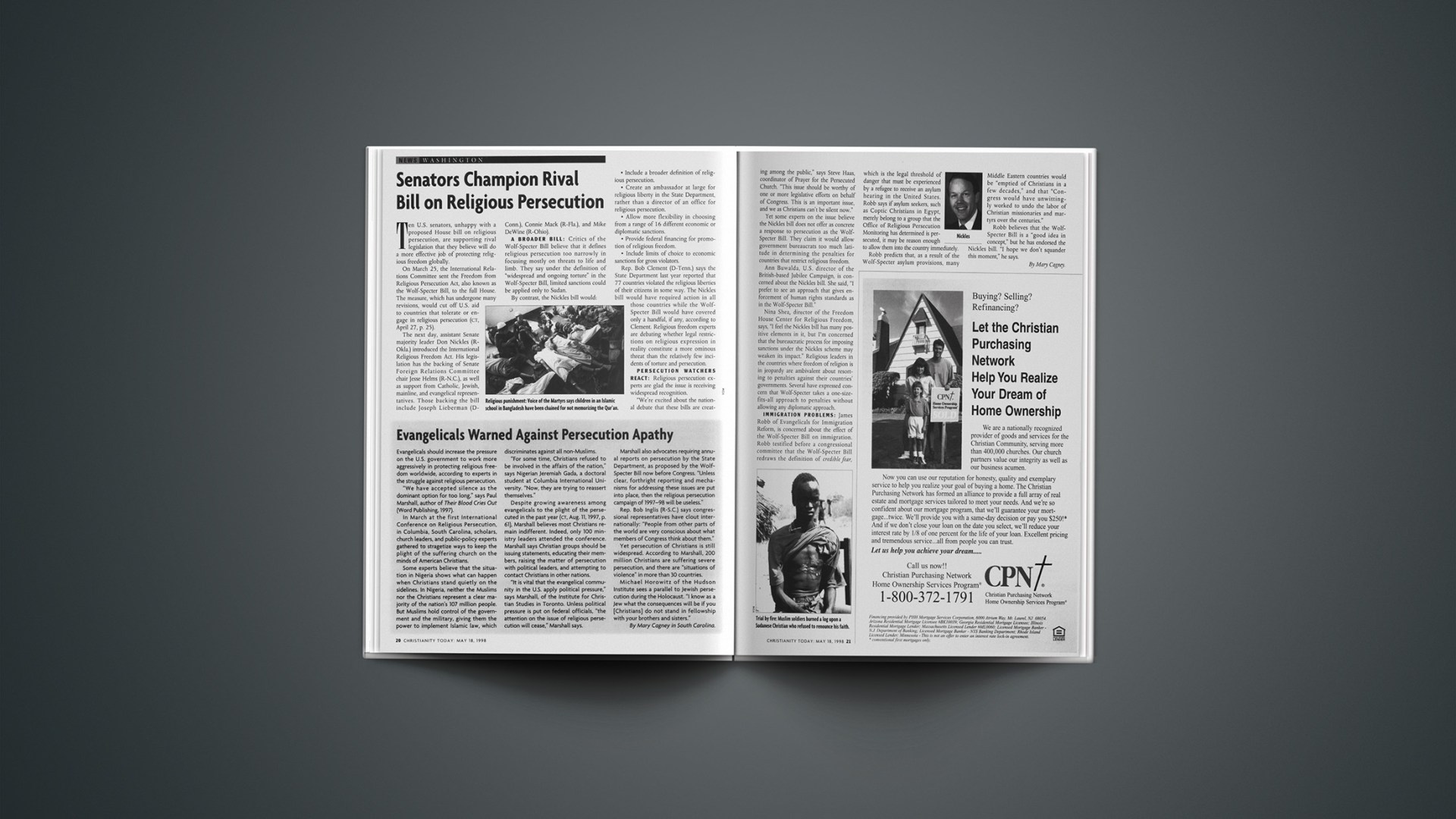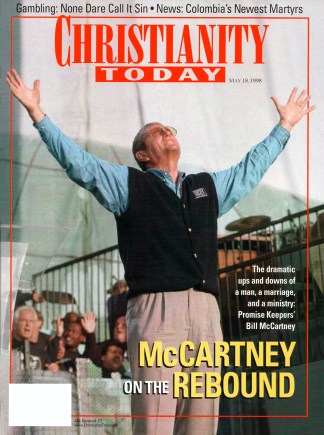Ten U.S. senators, unhappy with a proposed House bill on religious persecution, are supporting rival legislation that they believe will do a more effective job of protecting religious freedom globally.
On March 25, the International Relations Committee sent the Freedom from Religious Persecution Act, also known as the Wolf-Specter Bill, to the full House. The measure, which has undergone many revisions, would cut off U.S. aid to countries that tolerate or engage in religious persecution (CT, April 27, p. 25).
The next day, assistant Senate majority leader Don Nickles (R-Okla.) introduced the International Religious Freedom Act. His legislation has the backing of Senate Foreign Relations Committee chair Jesse Helms (R-N.C.), as well as support from Catholic, Jewish, mainline, and evangelical representatives. Those backing the bill include Joseph Lieberman (D-Conn.), Connie Mack (R-Fla.), and Mike DeWine (R-Ohio).
A BROADER BILL: Critics of the Wolf-Specter Bill believe that it defines religious persecution too narrowly in focusing mostly on threats to life and limb. They say under the definition of “widespread and ongoing torture” in the Wolf-Specter Bill, limited sanctions could be applied only to Sudan.
By contrast, the Nickles bill would:
- Include a broader definition of religious persecution.
- Create an ambassador at large for religious liberty in the State Department, rather than a director of an office for religious persecution.
- Allow more flexibility in choosing from a range of 16 different economic or diplomatic sanctions.
- Provide federal financing for promotion of religious freedom.
- Include limits of choice to economic sanctions for gross violators.
Rep. Bob Clement (D-Tenn.) says the State Department last year reported that 77 countries violated the religious liberties of their citizens in some way. The Nickles bill would have required action in all those countries while the Wolf-Specter Bill would have covered only a handful, if any, according to Clement. Religious freedom experts are debating whether legal restrictions on religious expression in reality constitute a more ominous threat than the relatively few incidents of torture and persecution.
PERSECUTION WATCHERS REACT: Religious persecution experts are glad the issue is receiving widespread recognition.
“We’re excited about the national debate that these bills are creating among the public,” says Steve Haas, coordinator of Prayer for the Persecuted Church. “This issue should be worthy of one or more legislative efforts on behalf of Congress. This is an important issue, and we as Christians can’t be silent now.”
Yet some experts on the issue believe the Nickles bill does not offer as concrete a response to persecution as the Wolf-Specter Bill. They claim it would allow government bureaucrats too much latitude in determining the penalties for countries that restrict religious freedom.
Ann Buwalda, U.S. director of the British-based Jubilee Campaign, is concerned about the Nickles bill. She said, “I prefer to see an approach that gives enforcement of human rights standards as in the Wolf-Specter Bill.”
Nina Shea, director of the Freedom House Center for Religious Freedom, says, “I feel the Nickles bill has many positive elements in it, but I’m concerned that the bureaucratic process for imposing sanctions under the Nickles scheme may weaken its impact.” Religious leaders in the countries where freedom of religion is in jeopardy are ambivalent about resorting to penalties against their countries’ governments. Several have expressed concern that Wolf-Specter takes a one-size-fits-all approach to penalties without allowing any diplomatic approach.
IMMIGRATION PROBLEMS: James Robb of Evangelicals for Immigration Reform, is concerned about the effect of the Wolf-Specter Bill on immigration. Robb testified before a congressional committee that the Wolf-Specter Bill redraws the definition of credible fear, which is the legal threshold of danger that must be experienced by a refugee to receive an asylum hearing in the United States. Robb says if asylum seekers, such as Coptic Christians in Egypt, merely belong to a group that the Office of Religious Persecution Monitoring has determined is persecuted, it may be reason enough to allow them into the country immediately.
Robb predicts that, as a result of the Wolf-Specter asylum provisions, many Middle Eastern countries would be “emptied of Christians in a few decades,” and that “Congress would have unwittingly worked to undo the labor of Christian missionaries and martyrs over the centuries.”
Robb believes that the Wolf-Specter Bill is a “good idea in concept,” but he has endorsed the Nickles bill. “I hope we don’t squander this moment,” he says.
Copyright © 1998 Christianity Today. Click for reprint information.










